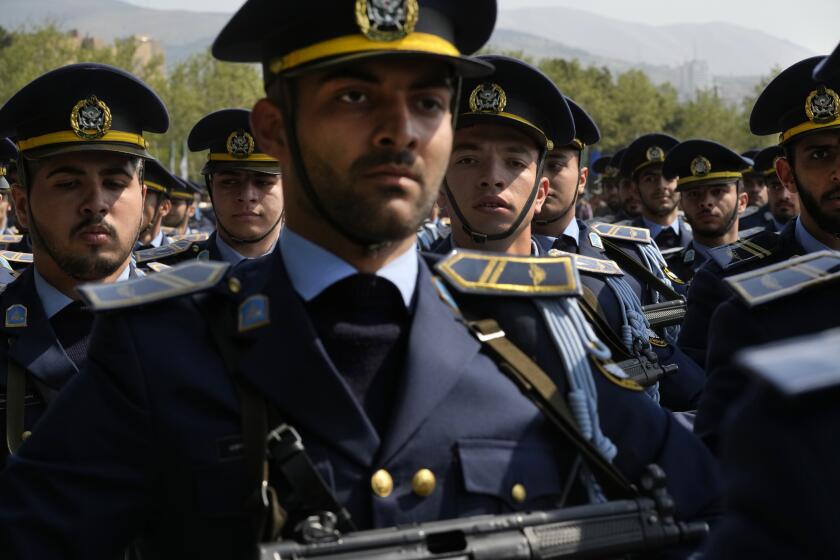
- Share via
- Protests erupted in Iran, other Iranian-backed groups vowed revenge and some Lebanese wept in the streets.
- Israeli Prime Minister Benjamin Netanyahu called Nasrallah “not just another terrorist — he was the terrorist.”
- The State Department ordered the departure from Lebanon of some nonessential U.S. Embassy employees and dependents.
BEIRUT — The assassination of Hezbollah leader Hassan Nasrallah — confirmed by both Israel and the Lebanese militant group on Saturday, a day after the massive air raid that killed him — set off furious grief among his followers and prompted grim satisfaction in Israel, redoubling fears of a widening regional conflict.
The 64-year-old Nasrallah, who had led the Iranian-backed group for more than three decades, died in a devastating Israeli strike Friday evening in Beirut’s southern suburbs, according to announcements issued hours apart by the Israeli military and Hezbollah, the paramilitary force and political party he helped found.
For more than 24 hours after Friday’s air raid, Israeli warplanes continued to pummel Hezbollah-dominated neighborhoods on the city’s southern outskirts, leaving the Lebanese capital shrouded in choking smoke and lending an apocalyptic air to the open-air encampments of airstrike-displaced people that sprang up overnight.
Israel was on high alert for retaliation and placed restrictions on large public gatherings. At the same time, it vowed more strikes, with its military chief of staff, Lt. Gen. Herzi Halevi, declaring in a video message that Israel aimed to destroy Hezbollah.
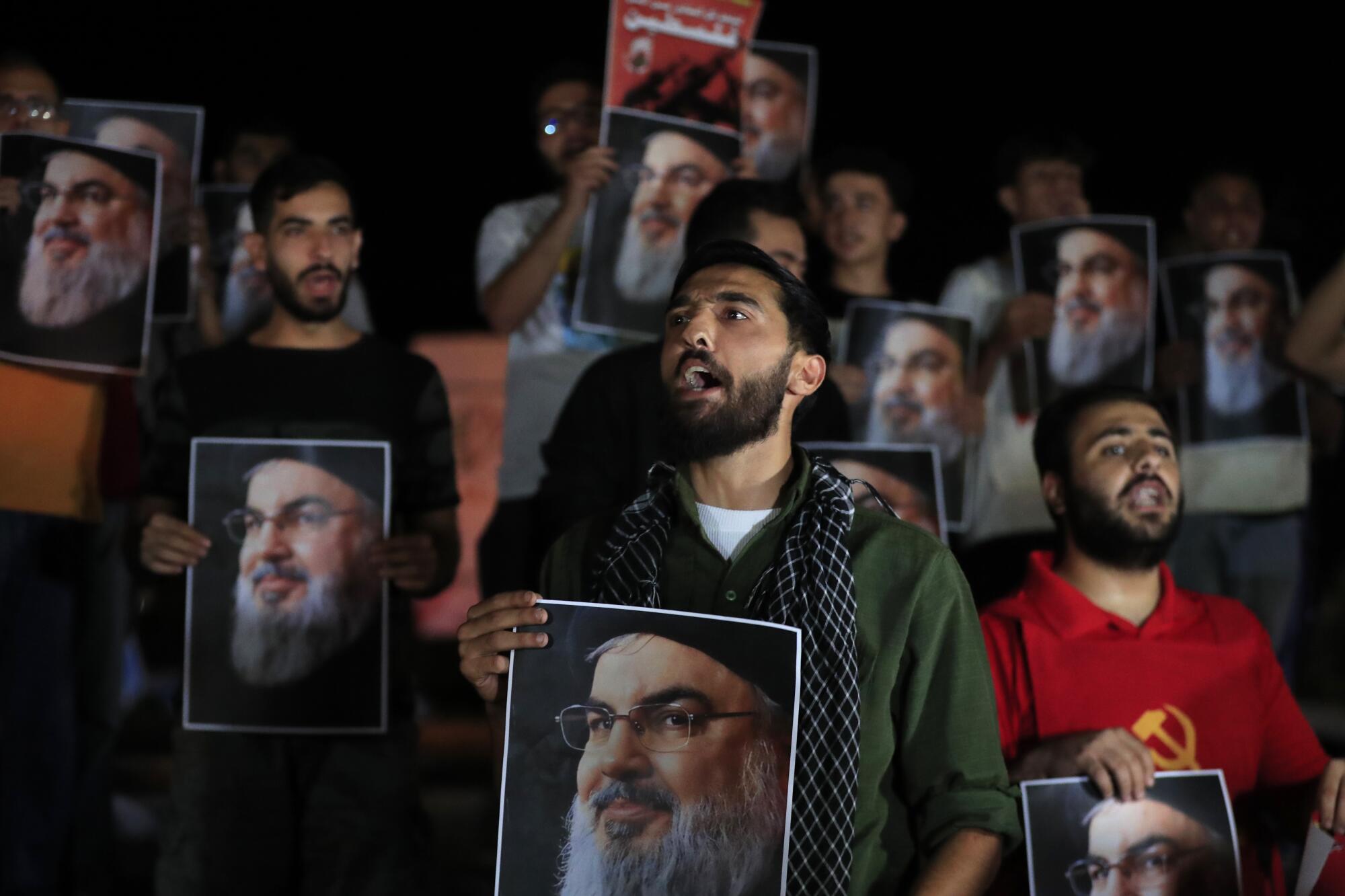
While protests erupted in Tehran and some Lebanese wept in the streets, Israelis, by and large, rejoiced. Nasrallah, said Prime Minister Benjamin Netanyahu, “was not just another terrorist — he was the terrorist.”
President Biden said the U.S. wanted to “de-escalate” conflicts in both Lebanon and the Gaza Strip. At the same time, however, he said Israel had a right to self-defense, and that Nasrallah’s death represented a “measure of justice” for his victims, including Americans killed in Hezbollah terrorist attacks in the 1980s. The State Department, bowing to what it called the “volatile and unpredictable security situation” in Lebanon, ordered the departure of some nonessential U.S. Embassy employees and dependents. The department had previously issued its strongest warning against travel to the country by U.S. citizens, and urged Americans to leave while commercial travel was still available.
In Beirut, thousands who fled waves of thunderous blasts bedded down for a second night outdoors, huddling where they could in parks, squares and on walkways near the seafront promenade. A flotsam of discarded water bottles, soda cans, coffee cups and cigarette packs surrounded them.
The death of Nasrallah represents the most staggering blow yet to the Iranian-backed group by Israel, which over a span of nearly two weeks turned a low-level campaign of retaliatory cross-border strikes into an all-out effort to decapitate the group.
The Israeli military initially disclosed the death in a terse statement posted on social media: “Hassan Nasrallah will no longer be able to terrorize the world.”
Later, it posted a graphic depicting 11 high-ranking members of Hezbollah’s military chain of command. Ten, including Nasrallah, had the word “Eliminated” alongside their pictures.
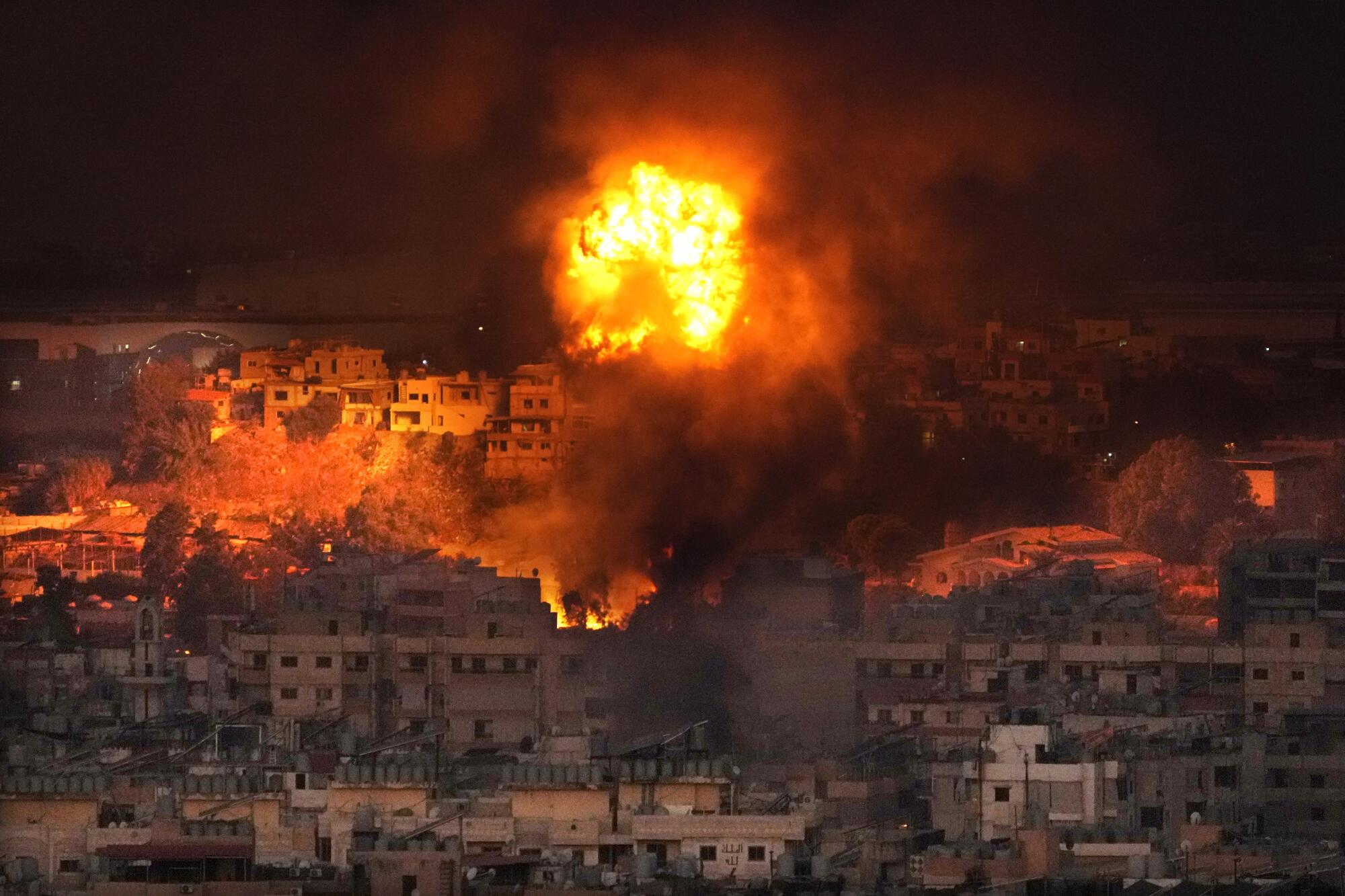
Hezbollah responded with a barrage of rockets into Israel. The Israeli military reported no casualties from what it said were at least 90 projectiles fired mainly at the country’s north.
In Beirut, the Israeli strikes caused widespread panic, with thousands of people carrying backpacks, duffel bags, roller suitcases and pet cages as they fled their homes in the densely populated suburb of Dahieh and the nearby Burj al Barajneh refugee camp.
Khaled Mustafa, a 45-year-old Syrian tailor from Aleppo who lived with his family for the last nine years in Haret Hreik, a neighborhood with many Hezbollah administrative offices, sat cross-legged in the shade of a palm tree on a sidewalk overlooking the Mediterranean. After Friday evening’s raid, he left his apartment without taking any belongings.
“I sent my family back to Syria last night. Eight people. I’m alone here,” Mustafa said. Though he did not feel safe returning to Syria, a country embroiled in a civil war since 2011, it was still better than being in Dahieh, he said. “Where can I go? What can I do? Sit on the streets here with no food, no water? Is this good?”
Hezbollah posted on its official social media channels a flier with phone numbers that could facilitate transportation to Syria for those wanting to leave Lebanon.
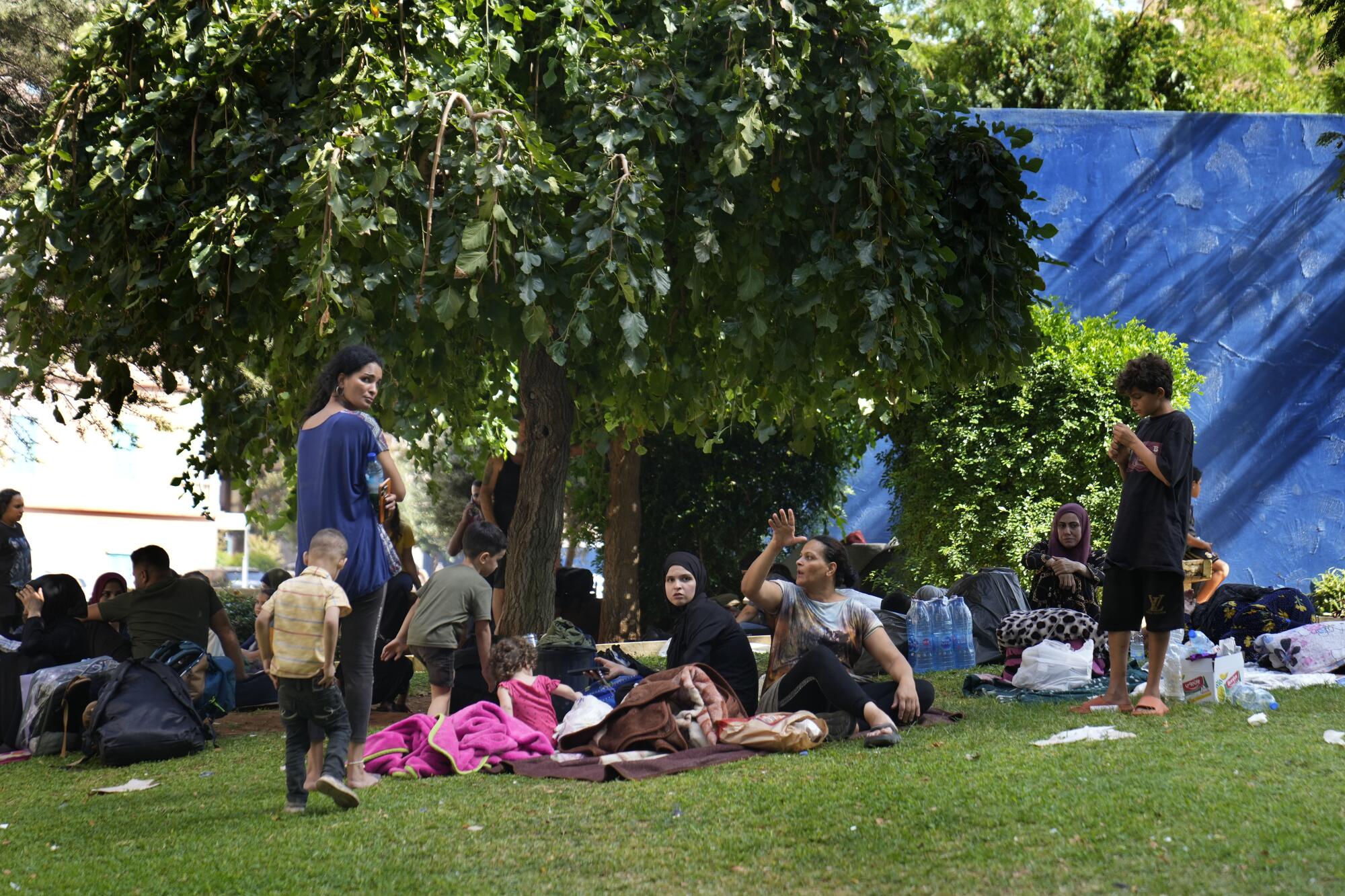
Along Beirut’s famed Corniche, where people normally stroll by the seaside, hundreds of the displaced set up a makeshift encampment, with cars double-parked on both sides of the highway. The more enterprising strung up clotheslines between palm trees and hung bedsheets for impromptu shelters. Others lay on mattresses, smoking waterpipes.
A drive through Dahieh, the strikes’ epicenter, revealed a ghost town, with a few cars and scooters racing through abandoned thoroughfares, pausing at columns of smoke rising from attack sites before they sped off. Even Hezbollah security officials, normally a constant presence on the streets here, were scarce, with only a few stragglers posted near stricken areas. Checkpoints normally manned by Lebanese army soldiers stood empty. After darkness fell, only a few people walked about with their belongings, the occasional shop sign providing the only illumination.
At the site of the wrecked residential compound that had overlaid the targeted underground headquarters, black smoke still belched from the basement level.
“After this, how can we feel anything?” asked a 26-year-old Hezbollah security man who identified himself only as Ziyad.
His companion Zain, another 26-year-old, appeared almost tearful, saying: “The future is gone.”
According to the Lebanese health ministry, Friday’s strike killed 11 people and injured 108 others, with the toll expected to rise as bodies were recovered. In all, the ministry said, more than 1,000 people had been killed in Lebanon since mid-September.
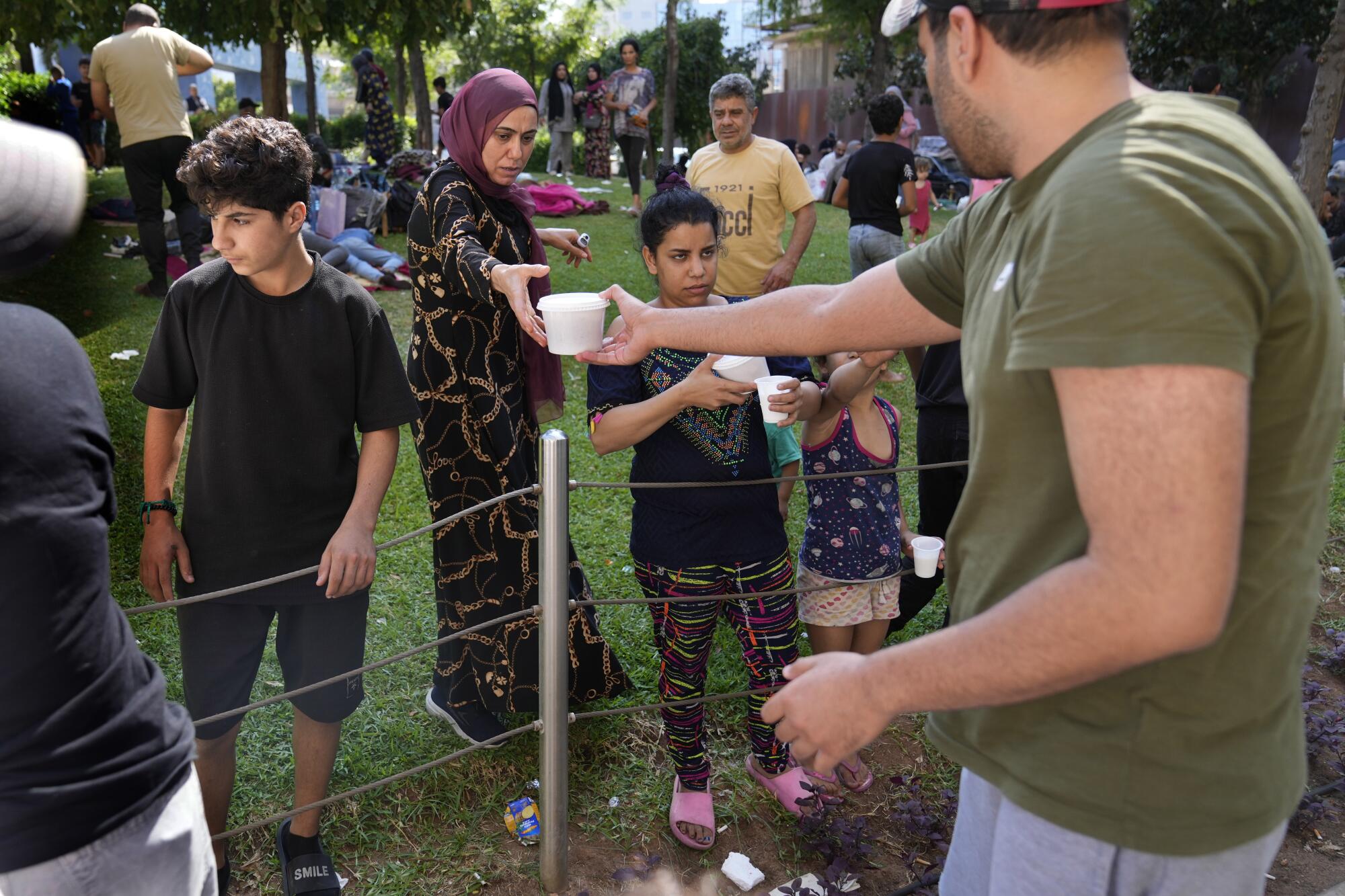
The ministry also said in an update on Saturday that Dahieh hospitals were to be evacuated, adding that medical facilities in other parts of the city would suspend non-urgent cases until the end of next week.
Hezbollah has long been viewed as Israel’s top regional adversary. The group began a campaign of cross-border attacks almost immediately after the Palestinian militant group Hamas attacked southern Israel Oct. 7, killing about 1,200 people and seizing around 250 hostages.
Over the last 11 months, parallel to the Israel-Hamas war in Gaza, Israel and Hezbollah engaged in an escalating series of strikes, mainly confined to the frontier region and always falling short of full-scale conflict. On both sides of the border, tens of thousands fled their homes — some 90,000 Lebanese were displaced from the country’s south, and about 60,000 were driven from northern Israeli communities.
But Israel’s calculus changed in recent weeks, with Netanyahu saying his government would make the ability of northern residents to return home a formal war objective. In the days following, Israel staged a two-day wave of detonations with booby-trapped pagers and walkie-talkies used by Hezbollah, followed by intensive airstrikes and the targeted assassinations.
Here’s a look at the so-called Axis of Resistance, an Iran-backed coalition including Hezbollah, Hamas and other militant groups devoted to destroying Israel.
Analysts said Nasrallah’s death represents a body blow to Hezbollah, but not a fatal one — particularly if Iran continues to train, supply and arm it.
“The root of the organization remains, in the sense that there is still the narrative of the belief in the cause,” said Mohanad Hage Ali, a Hezbollah expert at the Carnegie Middle East Center. “I fail to see how the core organization would just go away and sit at home after this.”
Hezbollah, he said, can “continue to cause harm to the Israelis in the next phase,” especially in the event of a ground incursion. Earlier this week, the Israeli military sent two brigades to the country’s north to train for such a potential scenario, and said additional reservists have been mobilized.
Others, though, saw the latest Israeli strikes as a decisive moment. Analyst Kobi Michael, a senior research fellow at the Institute for National Security Studies in Tel Aviv, called Nasrallah’s death a “game changer.” Without him, “the entire organizational framework of Hezbollah is harmed in a very significant manner,” he told reporters.
Nasrallah was not the only top Hezbollah leader to die in Friday’s strike. Ali Karki, the commander of Hezbollah’s Southern Front and other commanders were also killed, the Israeli military said.
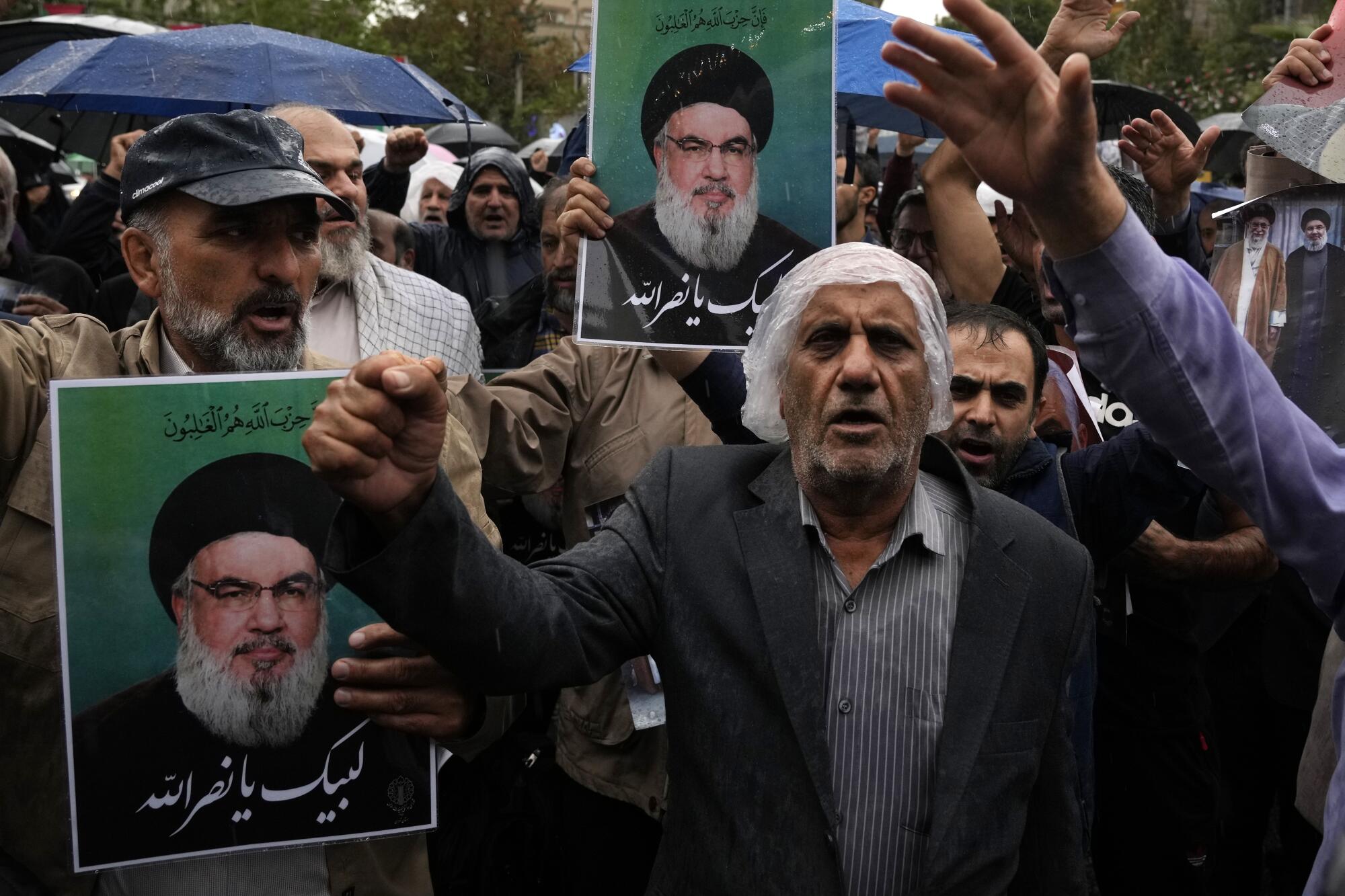
And Iran, chief sponsor of Hezbollah and other anti-Israel paramilitary forces in the region, was also caught up in Friday’s strike. Iran’s official IRNA news agency said Saturday that Abbas Nilforushan, a prominent general in its paramilitary Revolutionary Guard, had been killed as well.
On Saturday, Iran’s Supreme Leader Ayatollah Ali Khamenei denounced the “Zionist entity” — a reference to Israel — and said that what he called the resistance, a coalition of Iranian regional proxies, would prevail.
That encompasses forces including Hezbollah, the Palestinian groups Hamas and the Palestinian Islamic Jihad, Houthi rebels in Yemen, various Syrian and Iraqi militias, and the Syrian government.
Aaron David Miller, a veteran Middle East expert and former envoy to the region, said Nasrallah’s killing could force Hezbollah, Iran and perhaps Hamas to a decision point.
“Whether it leads to escalation and regional war or deescalation and transactional diplomacy isn’t yet clear,” he wrote on X.
Houthi rebels, who unsuccessfully launched a ballistic missile toward Israel’s main international airport as Netanyahu was returning to the country early Saturday from an appearance at the United Nations, said in a statement that “the resistance will not be broken.”
Hamas, still locked in combat with Israel in Gaza, sent condolences to Hezbollah. It said the deaths of Nasrallah and other commanders only left it and allied groups “more valiant, stronger, and more determined to continue the confrontation.”
Bulos reported from Beirut and King and Wilkinson from Washington.
More to Read
Sign up for Essential California
The most important California stories and recommendations in your inbox every morning.
You may occasionally receive promotional content from the Los Angeles Times.
